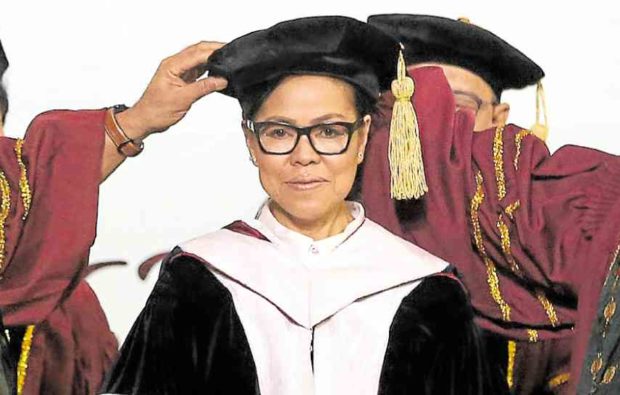White House chef Comerford awarded UP honorary degree
MANILA, Philippines — As the White House’s top chef, Cristeta Pasia-Comerford has cooked the meals of three US presidents, countless heads of state and an esteemed array of visiting dignitaries, including Queen Elizabeth II.
But on Monday, as she was conferred an honorary degree of Doctor of Humane Letters by the University of the Philippines (UP), Comerford talked not about gleaming, presidential kitchens but the place that “started it all” — the small village of Maasim in San Rafael, Bulacan province.
“My mother thought it would be a great idea to drop off my siblings and I at my grandparents’ home during the summer break,” said the Manila-born chef, who waxed nostalgic about the Filipino delicacies — tamales, kaymito, okra — that defined those balmy summers.
Where it all began
“I always feel like bursting into the ‘Bahay Kubo’ song when I think about it,” she said. “This is where I began to understand the values of work ethics, perseverance and community. This is where my earliest and fondest memories ignited my passion and interest in my profession.”
Article continues after this advertisementComerford was awarded the honorary degree (honoris causa in Latin) by UP president Danilo Concepcion and Commission on Higher Education Chair Prospero de Vera III at the university she affectionately called her “UP naming mahal.”
Article continues after this advertisementFull circle moment
While being a former UP student isn’t a requirement to receive the award, it was a full circle moment for Comerford, who was in the middle of earning a BS Food Technology degree from UP Diliman when her family emigrated to Chicago in 1983.
It was just 12 years later, in 1995, that she was recruited by White House Executive Chef Walter Stanley Scheib III to be sous chef at the world’s most famous residence.
Comerford became the White House executive chef in 2005, after a rigorous, monthslong selection process that drew 450 candidates, in a barrier-breaking moment—she was the first female, first minority and first Asian chef to hold the position since its inception in 1961.
Now she has become one of the longest-serving executive chefs in White House history, an impressive feat in a city constantly reshaped by turbulent and unpredictable political headwinds.
“I have always really admired Cristeta for what she has been contributing to the world not only to the American stage but also to the Philippine stage, as a Filipina in the White House,” said Sonia Delen, president of UP Alumni Association in San Francisco.
Delen nominated Comerford in February for the honorary doctorate, citing both the strides she’s made in the culinary world and humanitarian work she’s done in between.
Aside from planning and preparing the daily meals of the president and his family, Comerford is also charged with leading the painstaking preparation of state dinners, the “highest form of reception” in the White House, according to UP’s citation.
Elite club member
Being the executive chef has also landed her membership in an elite club of just 26 chefs known as Le Club des Chefs des Chefs, an organization exclusive to the chefs for heads of state.
Shifting effortlessly into Tagalog, Comerford began her speech with the famous Filipino saying, “Ang hindi marunong lumingon sa pinanggalingan, hindi makakarating sa paroroonan (Those who don’t look back at where they came from will never get to their destination).”
‘One of the best cooks’
The chef painted a vivid picture of the summers she spent with her Lola — one of the “best cooks I knew” — at Maasim, where an outdoor clay kitchen was her playground long before the fine-dining restaurants she would find herself navigating with ease decades later.
“The aroma from the bounties of the seas and the land emanated from our clay kitchen,” Comerford said. “I could clearly remember the paella valenciana [my grandmother] cooked. The crust of the tutong is always the prized possession, so everybody fought for it.”
“The homestead was flanked by the Sierra Madre Mountain range on the north, lush and bright green acreages of rice paddies on the east, and a crystal clear gushing river replete with local fresh water fishes like tilapia and dalagang bukid,” she recounted.
It was within this distinctly Filipino setup that she learned the insight that would catapult her from a young immigrant to the chef for the so-called leaders of the free world: “For you to succeed, anything you would do, you must be passionately in love with whatever it is,” she said.
